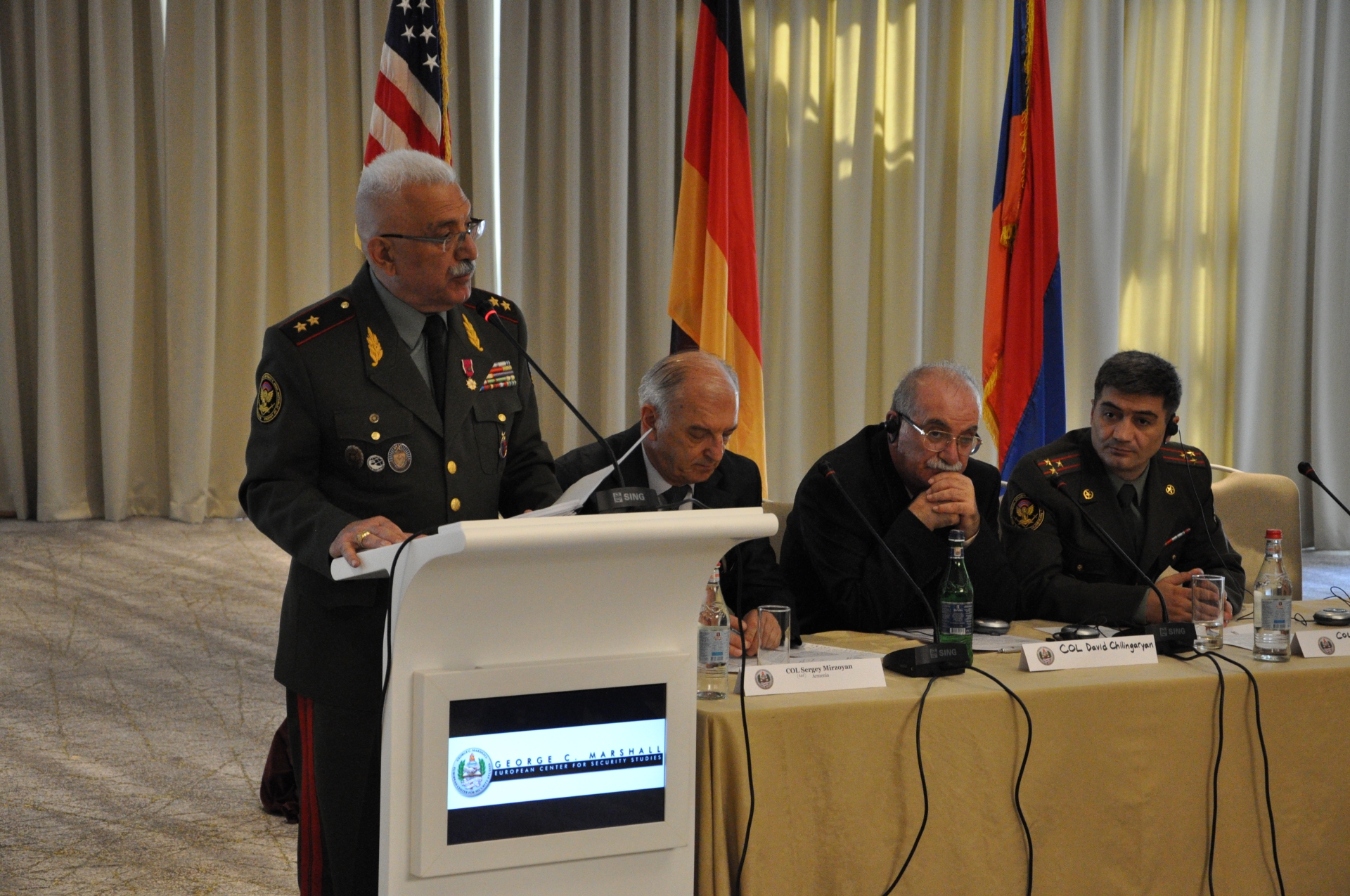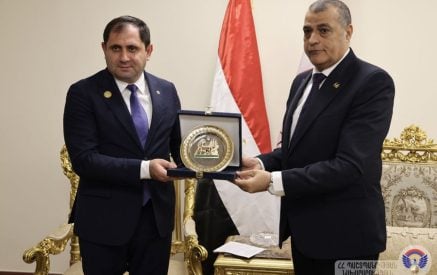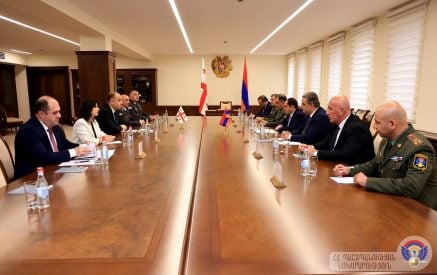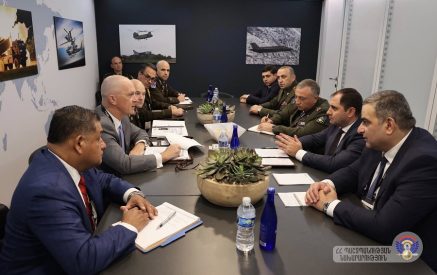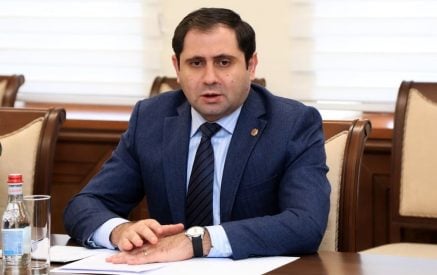On 1 September at Yerevan “Marriot Hotel” “Tigran Mets” Hall, the Armenia George C. Marshall Center Alumni Outreach Event was held on the topic “Armenia’s Security Challenges”. The Event was chaired by H.E. Richard M. Mills Jr., the US Ambassador to Armenia, H.E. Bernhard Matthias Kiesler, the German Ambassador to Armenia, Mr. Artak Zakaryan, First Deputy Minister of Defense of the Republic of Armenia, and Lieutenant General (R) Keith W. Dayton, Director of the George C. Marshall European Center for Security Studies.
Among the speakers were Marshall Center Graduates Lieutenant General, Professor Hayk Kotanjian, Doctor of Political Science, Head, National Defense Research University (NDRU), Colonel Gevorg Sarukhanyan, Deputy Head, NDRU, and Colonel (R) David Chilingaryan, Head, Academic-Publishing Center – Editor-in Chief, “Haikakan Banak” Defense-Academic Journal, NDRU.
Below is script of Professor Hayk Kotanjian’s speech, the key notions of which he had delivered to the Russian party of the Minsk Group Co-Chairs at the Joint Session of the Standing Committee on Foreign Relations of the National Assembly of the Republic of Armenia and the Committee on International Affairs of the State Duma of the Russian Federation on 19 November, 2016.
By this speech Lieutenant General Kotanjian introduces the new recommendations elaborated via the additional research on the containment in the Karabakh Conflict zone conducted by the NDRU research-fellows.
***
First of all, I would like to express my gratitude towards the US Embassy in Yerevan for its support and efforts in organizing today’s event.
It’s my pleasure to have an opportunity to use my Alma Mater estimable Marshall Center academic-expert podium for the balanced promotion at this turn to the Western audience of the idea to raise a tremendous security possibility. The case is made for transferring our region’s conflict zones’ orbital outer sensing results to the UN Office of the Outer Space Affairs for the technical assessment of said results. I have presented earlier the idea of using orbital sensing as a deterrence tool in Karabakh Conflict to the Minsk Group Russian Co-Chair party at the Joint Session of the Standing Committee on Foreign Relations of the National Assembly of the Republic of Armenia and the Committee on International Affairs of the State Duma of the Russian Federation.
The current presentation is an outcome of the additional research conducted by our NDRU team, targeted at the Minsk Group peace-oriented process to the tangible way ahead. Now, I believe, this is a timely occasion to convey these instrumental messages to the Minsk Group American Co-Chair party.
Elaborating the ways to move forward towards the settlement of the Karabakh conflict, we cannot circumvent the issue of US – Russia relations being two UN Security Council permanent members and Co-Chairs of the OSCE Minsk Group. Both American and Russian experts, generals and diplomats, involved in the professional evaluation of US–Russia relations in recent years, did mention the discrepancy of negotiating parties’ positions in the Minsk format on Ukraine, as well as in talks on Syria.
Meanwhile, the platform of the OSCE Minsk Group Co-Chairmanship on the Karabakh Conflict peaceful settlement stands out among the political-diplomatic platforms of long-lasting and unbroken international security consensus regarding the positions of the US, Russia and France. This unbroken consensus confirmed its exceptional value also in the Vienna Summit Talks of 16 May, 2016 and the 20 June, 2016 Summit in St. Petersburg.
Speaking on dynamics of US – Russia relations, it’s worthy to mention that at the dawn of the “US–Russia Reset” in 2010, I happened to be an academic consultant of the “US–Russia Strategic Dialogue” at Harvard Kennedy School of Government, which enabled me to professionally keep a close watch of the dynamics of US–Russia relations.
Discussing the ways forward in the Karabakh conflict settlement process, we should take into account that any resumption of hostilities entails a threat of opening a new chapter of genocidal tragedies across this region bridging the East and the West, where dismal genocide of Christians, Jews, Yazidis, and Muslims, not engaged in the terroristic jihad, has been perpetrated by the torturers of the Islamic State.
The urgency of the “Never Again” principle for the Armenian people once again was called forth during the Perestroika in the USSR – at the time of pogroms committed by Azerbaijan against its Armenians population [3]. On 23 November, 1991, the Supreme Council of Azerbaijan passed a law on the dissolution of the Nagorno-Karabakh Autonomous Oblast (NKAO) without the Karabakh people’s consent and with violations of the basic international norms regarding the peoples’ right to self-determination. In response to those illegal actions, on 10 December, 1991, Nagorno-Karabakh initiated the process of its independence in compliance with the domestic legislation of the USSR. After the collapse of the Soviet Union, two states were formed: the Republic of Azerbaijan on the territory of the Azerbaijan SSR, and the Republic of Nagorno-Karabakh on the territory of the Nagorno-Karabakh Autonomous Oblast. The establishment of both States has a similar legal basis, therefore, the legitimate establishment of the Nagorno-Karabakh Republic, on the basis of its peoples’ right to self-determination, should never be considered within the scope of the Republic of Azerbaijan’s territorial integrity.
Strictly meeting international standards and the USSR Law of 3 April, 1990, a Referendum of Independence was held in Nagorno-Karabakh attended by international observers. The Azerbaijani minority of the NKR was given an opportunity to take part in the referendum; however, on Baku’s instructions they declined that opportunity [4]. Subsequent events eliminated the imperative obligation of coordinating the referendum results with the USSR central bodies, since on 21 December, 1991 the Alma-Ata Declaration on the Dissolution of the Soviet Union was signed [5]. Hence, the referendum held on the territory of Nagorno-Karabakh is legal; the establishment of the Nagorno-Karabakh Republic was carried out in conformity with the principles and attributes required by International Law. In 1992, the Azerbaijani Republic launched a war against Nagorno-Karabakh, which was waged until 1994 when Azerbaijan, Nagorno-Karabakh and Armenia signed a ceasefire agreement with no time limitation, and in 1995 – a tripartite agreement on strengthening the ceasefire in the Nagorno-Karabakh. These agreements were recognized by the conflicting parties and the OSCE Minsk Group Co-Chairs on the Nagorno-Karabakh conflict as permanent by nature and constituting the basis of a long-run truce in the conflict zone. The international community has repeatedly reaffirmed its vision of the settlement of the Karabakh Conflict, which has to be based on the three main and equal principles of the International Law: “the equal rights and self-determination of peoples, the non-use of force or threat of force, and territorial integrity”.
On 2 April, 2016, 22 years after the 1994 ceasefire agreement, the Azerbaijani Armed Forces launched a large-scale surprise attack along the Karabakh-Azerbaijani line of contact with the main goals to undermine the OSCE Minsk Group Co-Chairs mission to peacefully resolve the conflict, occupy Nagorno-Karabakh, and commit genocide against its Armenian population. This behavior of Azerbaijan is largely due to the lack of investigation mechanisms that would register the dynamics of the resumption of hostilities around the line of contact. Azerbaijan has persistently rejected the OSCE Minsk Group Co-Chairs’ proposals on monitoring the ceasefire by use of technical and human professional resources that would contain the resumption of hostilities.
The convergence of positions of Russia, the US and France in Vienna consultations on the results of the April 2016 Four-Day War in Karabakh led Armenia and Azerbaijan to agree on the need of establishing control over the preparations for war in the armed conflict zone in order to prevent the parties from resuming hostilities. Enacting the smart combination of technological innovations along with the methods of political-diplomatic influence on the preparation for combat operations will pave the way for developing a concept of containment through effective investigation mechanisms for ceasefire violations and more efficient implementation of monitoring over military forces’ accumulation and movement signaling war preparations.
In this sense, it is essential to proceed from the understanding that under the current trend towards the escalation of the arms imbalance between Artsakh Republic on the one side, and Azerbaijan – on the other, it is unacceptable to rely purely on the traditional military deterrence seeking to prevent the resumption of hostilities. In that event, we find it vital to academically comprehend innovative approaches to cooperating with the international community aimed at utilizing its high-tech tools for the sensing of military forces’ dangerous maneuvers signaling preparations for expanded military operations.
The point is the methodology we developed in the National Defense Research University of Armenia for engaging the OSCE Minsk Group Co-Chair states in the initiative of sensing any dangerous dynamics of force in the Karabakh Conflict zone through the sighting aid from the supranational outer space via orbital facilities of remote sensing.
As you know, the International Space Law enables the international community to inspect from the near-Earth space the dynamics of the troops preparation for the resumption of hostilities in the conflict zones. Targeted at preventing a war, this kind of remote inspection can be used in conformity with international norms and regulations as an innovative power tool of political-diplomatic containment through consultations and negotiations.
According to the Declaration of Legal Principles Governing the Activities of States in the Exploration and Use of Outer Space, “To promote and intensify international cooperation, especially with regard to the needs of developing countries, a State carrying out remote sensing of the Earth from space shall, upon request, enter into consultations with a State whose territory is sensed”,[l] and the Treaty on Principles Governing the Activities of States in the Exploration and Use of Outer Space, including the Moon and Other Celestial Bodies states that “Outer Space, including the Moon and other celestial bodies, is not subject to national appropriation by claim of sovereignty, by means of use or occupation, or by any other means”[2].
With the proviso that mediating peacemaker powers applied this innovative method of containing war resumption via orbital facilities of remote sensing could become an effective tool in the case of protracted smoldering conflicts, and be a strategically important factor for the regional security.
The meeting between the Armenian and Azerbaijani Presidents in Vienna in May 2016 yielded an agreement on the establishment of investigation mechanisms for ceasefire violations along the conflict’s line of contact, and the expansion of the capabilities of the team of the Personal Representative of the OSCE Chairperson in Office. This was a timely decision since one of the sides has been actively buying offensive weapons, thus upsetting the military balance. Simultaneously, the results of the 2016 meetings in Vienna and St. Petersburg could be considered not only as a consensus on monitoring the ceasefire regime from the national air spaces of the two conflicting parties, but as successful consultations with the Republic of Armenia and the Republic of Azerbaijan on investigation mechanisms from the outer space targeted at revealing warlike preparations through the accumulation of offensive weapons and movement of troops. [6].
In this regard, The United Nations Office for Outer Space Affairs (UNOOSA) may play an important role. This office is responsible for promoting international cooperation in the peaceful uses of outer space, and serves as the secretariat for the United Nations Committee on the Peaceful Uses of Outer Space. [7]
The Committee was established in 1959 to govern the exploration and use of space for the benefit of all humanity. Currently Armenia and Azerbaijan, as well as all three Minsk Group Co-Chair states, are members of the Committee, which creates a unique opportunity for using the Committee’s capabilities to support peace and stability in conflict zones.
To my mind, it would be useful if the United Nations Office for Outer Space Affairs received the data of conflict zones orbital sensing to further make a technical assessment and present results back to the concerned parties. The successful launch of this mechanism will create unique opportunities to use the UN Office for Outer Space Affairs for the purpose of the technical assessment of data received from conflict zones orbital sensing. I am hopeful that in this way this precedent can be transformed into a significant tool of promoting international peace and stability in Karabakh and beyond.
- See Принципы, касающиеся дистанционного зондирования Земли из космического пространства (Principles Relating to Remote Sensing of the Earth from Outer Space), https://www.un.org/ru/documents/decl conv/conventions/earth remote sensing.shtml.
- See Договор о принципах деятельности государств по исследованию и использованию
космического пространства, включая Луну и другие небесные тела (Treaty on Principles Governing the Activities of States in the Exploration and Use of Outer Space, including the Moon and Other Celestial Bodies),
https://www.un.org/ru/documents/decl conv/conventions/outer space governing.shtml.
- See Закон СССР “О порядке решения вопросов, связанных с выходом союзной республики из СССР” No 1410-1 от 3 апреля 1990 г.” Ведомости Съезда народных депутатов СССР, Верховного Совета СССР”, 1990, No 15, Декларация о провозглашении Нагорно-Карабахской Республики; Jacques Derrida, Isaiah Berlin, Alain Finkielkraut, Richard Rorty, and Adrian Lyttelton. An Open Letter on Anti-Armenian Pogroms in the Soviet Union. Joint Initiative of the Helsinki Treaty Watchdog Committee of France and Intellectuals from the
College International de Philosophic, Paris. September 27, 1990. The New York Review of Books, https://www.nybooks.com/articles/1990/09/27/an-open-letter-on-anti-armenian-pogroms- in-the-sov/; (USSR Law “On the procedure for regulation of issues related to the secession of a Union Republic from the USSR” No 1410-1 of3 April 1990, “Bulletin of the Congress of People’s Deputies of the USSR, the Supreme Council of the USSR”, 1990, No 15, Declaration on the Proclamation of the Nagorno-Karabakh Republic), www.nkr.am/ru/declaration/10/.
- See Акт о результатах референдума о независимости Нагорно-Карабахской Республики (Act on the results of the referendum of the independence of Nagorno-Karabakh Republic), nkr.am/ru/referendum/42/.
- See Алма-Атинская Декларация, Алма-Ата, 21 декабря 1991 г. (The Declaration of Alma-Ata, 21 December, 1991), https://cis.minsk.bv/page.php?id=178.
- See Joint Statement of the Minister of Foreign Affairs of the Russian Federation, Secretary of State of the United States of America and State Secretary for Europe Affairs of France https://www.osce.org/mg/240316, Meeting with Serzh Sargsyan and Ilham Aliev, https://en.kremlin.ru/events/president/news/52189.
- United Nations Office for Outer Space Affairs, https://www.unoosa.org/oosa/en/aboutus/roles-responsibilities.html.




















































